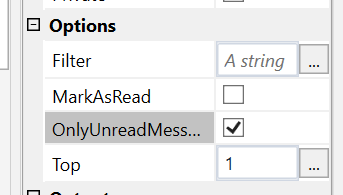Hi All,
I need a small help on how to Identify first email in a thread / conversation in Outlook. Automation should action only on the 1st email on the thread, hence looking for a solution.
Please assist.
Thanks
Vinod
Hi All,
I need a small help on how to Identify first email in a thread / conversation in Outlook. Automation should action only on the 1st email on the thread, hence looking for a solution.
Please assist.
Thanks
Vinod
hi,
in the properties check only unread option and top =1

![]()
Hi ,
@vr24 - This is give us unread message, i am aware of this property. My request is totally different. I dont want to read all unread messages.
Example : if we have a mail with subject " TEST RPA " then when some one replies to the email again we would start getting multiple mails like subject " RE: TEST RPA " .
My request is to read only the 1st mail of each chain and action only that mail and ignore the rest in the email chain. Please let meknow how to find out that the mail is the 1st email in that particular thread ?
Hope i am clear.
Thanks
Vinod
@vinodcrimson
you can create a condition to read any email without the subject starting with RE:
A simple if loop can help you to read the original email… To make that possible you may need to make the read email scope to a huge number.
@Shubham_Varshney - Yes i have done this method and i was looking if there is any other attribute with which i can figure out this parameter. Because just like RE: we can also get FW: so thought if there is anything else other than these values for us to use.
I usually add a filter to pick the subjects without RE: or FW:
That can be embedded in the get emails from Outlook Property. If you want I can share that as well with you ![]()
Sure @Shubham_Varshney . That will be great!
@vinodcrimson sorry I wasn’t able to connect earlier…
Not a pro in the SQL query, though I hope this works for you:
“@SQL=” + “”“” + “urn:schemas:httpmail:subject” + “”“” + " like ‘%%’ OR NOT" + “”“” + “urn:schemas:httpmail:subject” + “”“” + " like ‘%Re:%’ AND NOT" + “”“” + “urn:schemas:httpmail:subject” + “”“” + " like ‘%fw:%’ AND NOT" + “”“” + “urn:schemas:httpmail:subject” + “”“” + " like ‘%fwd:%’ "
I have similar requirement. Got a solution for this?